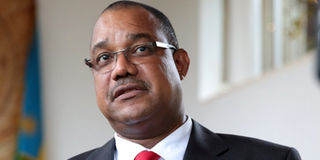Seychelles drops witchcraft charges against opposition leader

Patrick Herminie
What you need to know:
- Patrick Herminie, the head of the United Seychelles party who has said he plans to run in the 2025 presidential election, has repeatedly denounced the case as politically motivated.
Victoria. Prosecutors in Seychelles on Thursday dropped witchcraft charges against the leader of the country's main opposition party, more than four months after his initial arrest.
Patrick Herminie, the head of the United Seychelles party who has said he plans to run in the 2025 presidential election, has repeatedly denounced the case as politically motivated.
Herminie, also a former speaker of parliament, was arrested and charged last October along with seven other people at the Seychelles magistrates' court as part of a probe into "witchcraft" and "unnatural and superstitious" acts.
Prosecutors said at the time that Herminie's name was found in a WhatsApp message exchange with a Tanzanian man, who was detained in September allegedly in possession of items linked to witchcraft.
The items included black wooden artefacts, small bottles of brownish liquid and documents containing language and symbols described as satanic.
But on Thursday, the prosecutor told the court in Victoria: "I withdraw all charges against Patrick Herminie" as well as four other defendants.
Herminie told reporters outside the court that "the evidence in my possession shows that there is no case against me."
"What happened is just a malicious action," he added, describing the case as an "abuse of power" by President Wavel Ramkalawan.
"We do not have the right to arrest someone and put them in prison for nothing at all," he said.
The charges against the three remaining suspects, including the Tanzanian man, will remain in force.
The case is linked to an investigation into the discovery in August of the dug-up bodies of an elderly woman and a young man in a cemetery on the main Seychelles island of Mahe.
Prosecutors have also said symbols on the documents found in the Tanzanian's possession were similar to those found in places that were vandalised in Seychelles, including Catholic churches.



